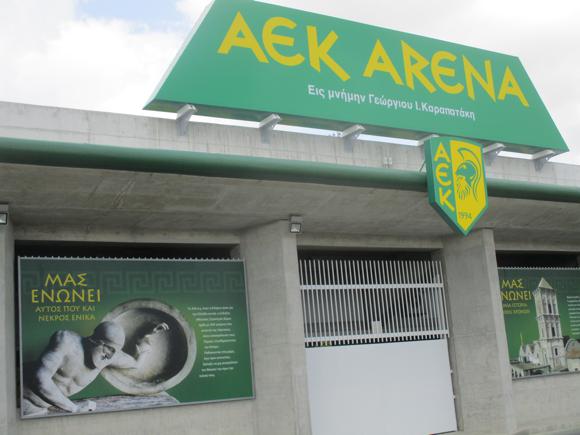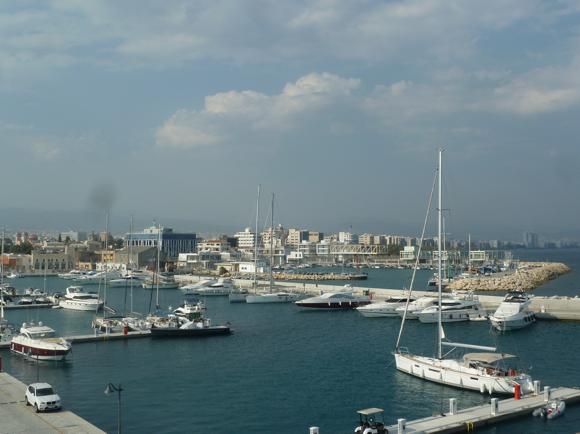Teams, tales and tips – a guide to the local game
The port, resort and airport hub of Larnaca on the southern coast of Cyprus is host to three teams who regularly compete in the 14-strong top-flight Cyta Championship.
Home of 2018 Cypriot Cup winners AEK, Larnaca has also been a haven for two clubs from the nearby port of Famagusta since 1974, when its majority Greek population fled the Turkish invasion.
Formed in 1911, revered Anorthosis have won 13 Cypriot titles and never been relegated. Populist Nea Salamis, with their left-leaning fan base, have played in the top flight every season but seven since 1949.
Permanent base for the flagship club of the same name, the new-build AEK Arena also staged every home game played by the Cypriot national side in 2022 and witnessed AEK’s dramatic penalty shoot-out defeat to Midtjylland in the Champions League.

The three main clubs play at stadiums away from Larnaca’s tourist-friendly, palm-fringed, beach-lined city centre. Anorthosis and Nea Salamis built their grounds some 15 years after their enforced exile. Both were used for the final stages of the 1992 European Under-16 Championships, welcoming the likes of Francesco Totti and Iván de la Peña.
It was also at the Antonis Papadopoulos, home of Anorthosis, that Cyprus beat Spain 3-2 in a Euro 2000 qualifier. Today the ground also stages the home games of Ermis Aradippou, recently a top-flight club, from the outskirts of Larnaca.
Nea Salamis named their ground Ammochostos – the Greek word for Famagusta.
Ammochostos Stadium now also plays host to Alki Oroklini, another Larnaca-based club often seen in the First Division, originally from a village eight kilometres from the city, close to the British military base of Dhekelia.

Promoted as Second Division champions in 2017, Alki are named after a former Larnaca club who folded in 2014. Backed by entrepreneur Andreas Loppas, an Alki Larnaca fan, former Omonia Oroklini changed their name, and their colours to the blue and red of their doomed predecessors.
Alki Larnaca, five-time Cypriot cup finalists between 1967 and 1980, were one of three local clubs who played at the city’s main sports stadium.
Built in 1928, the GSZ stood for ‘Gymnastic Club Zenon’, a reference to the stoic Greek philosopher who lived in what was then Kition and is now Larnaca. For 60 years, the rough-and-ready GSZ, near the city centre on a street still called Stadiou, hosted Alki Larnaca and the two clubs whose merger later created AEK (‘Athletic Union of Kition’) Larnaca in 1994.

Between them, AEK’s forefathers EPA and Pezoporikos won five Cypriot titles. Playing in green and white, Pezoporikos were founded in 1927. Three years later, EPA were formed by a merger of AMOL and Pezoporikos, whose dissident members later reformed the original club as a separate entity.
EPA (‘Union of Pezoporikos and AMOL’), in yellow and black, were the more prominent side in Larnaca. Their championship win of 1970 even entitled the club to compete in the Greek First Division, finishing bottom.
That same season, EPA took on Borussia Mönchengladbach, Günter Netzer, Berti Vogts and all, in the European Cup. The 16-0 whitewash remains Gladbach’s record aggregate win.

Three cup final appearances in four years also saw Pezoporikos in Europe. Giving a good account of themselves at home, the green-and-whites were thrashed at Cardiff, Cork and Malmö respectively.
With more European appearances – even Alki Larnaca had a brief, disastrous run-out in the UEFA Cup in 1979, losing 9-0 to Dinamo Bucharest at the GSZ – it was clear that the old ground was now longer suitable for the modern game.
Shortly after the last Pezopolis title win of 1988, the GSZ was demolished. A new GSZ had been built on the north-eastern outskirts of town, just past Larnaca General Hospital.

Later Irish international legends Robbie Keane and Richard Dunne would have good reason to have fond memories of the Neo GSZ, for it was here that Ireland won the 1988 European U-18 Championships, beating Germany on penalties.
The newly formed AEK Larnaca moved in for the 1994-95 season, drawing 0-0 with Barcelona here in 1996 and beating Rosenborg Trondheim to reach the group stage of the Europa League in 2011.
Abandoning the Neo GSZ, AEK built a new ground alongside, closer to the A3 highway that links Larnaca the tourist destination of Ayia Napa. Opened in 2016, the AEK Arena holds an all-seated 7,400, adequate for the club’s domestic needs. Across the walls, facing the somewhat dishevelled Neo GSZ, are splashed the colourful badges of Pezoporikos and EPA Larnaca, a nod to 90 years of footballing past.
Getting Around
Arriving in town, local transport and timings

Larnaca Airport is 5km (three miles) south-west of the city centre.
Shuttle buses mainly serve Limassol and Nicosia. For Larnaca, you need Zinon city bus 425 that leaves from the upper departures level, to the left as you exit the terminal. Buses run every 30mins (daily 6am-11.30pm) – pay driver €1.50 when boarding. It takes 20mins to reach the main stop at Finikoudes, the palm-fringed promenade by the beach and the city’s prominent strip of hotels and restaurants. The next stop, Larnaca Central Bus Station at the Marina, is close by.
Airport taxis will be to your right as you exit Arrivals. Official guidelines give the fare into town at €10 but you’ll probably pay about €12-€15.
The city centre is easily walkable – the stadiums are not, with the possible exception of the Ammochostos, home of Nea Salamis.
Zinon also runs a dozen or so bus routes across the city and beyond, most leaving from Larnaca Central Bus Station – but information and schedules are haphazard.
You’ll find a taxi rank opposite the main bus stop on Finikoudes. Taxi Larnaca (+357 99 411 905) is based in the city centre, while cheaper iTaxi Cyprus (+357 99 811 437) is near the AEK Arena, with online booking.
Where to Drink
The best pubs and bars for football fans
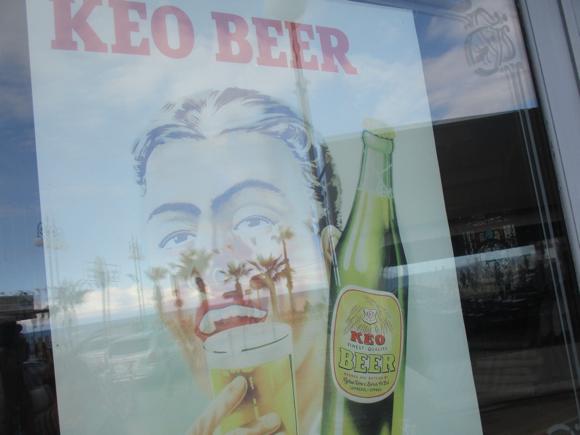
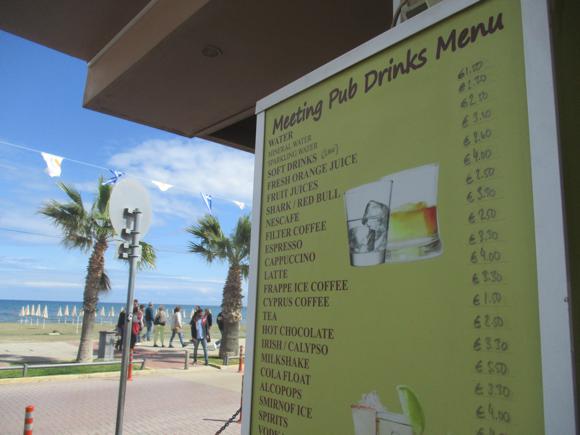
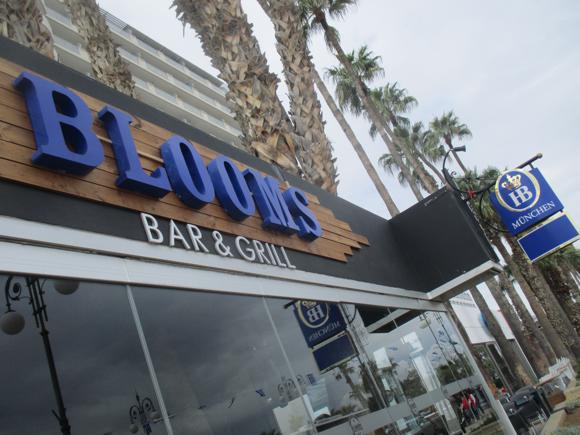
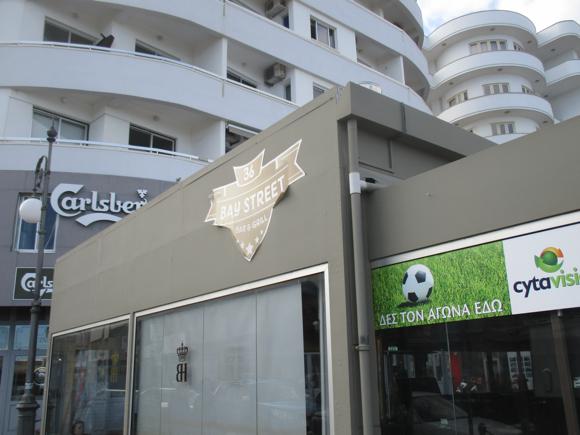
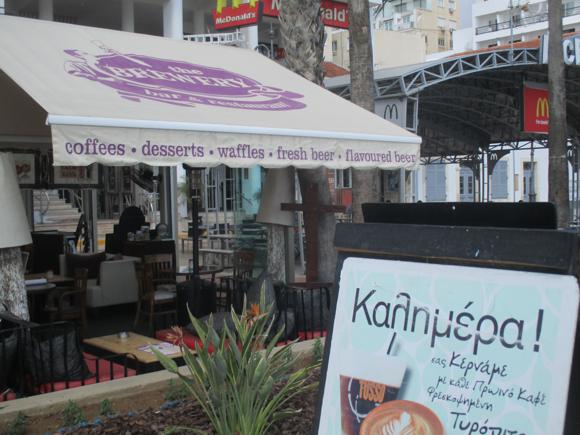
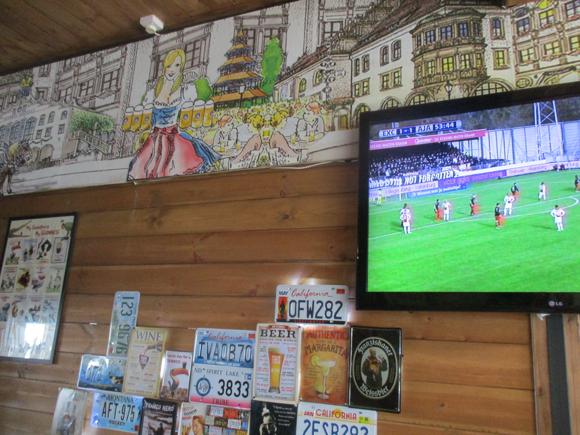
The seafront strip of Athenon and streets behind, particularly off Kosma Lysioti, are dotted with lively bars, most showing TV football.
Facing each other on the junction of Kosma Lysioti and Athenon, The Meeting Pub appeals to a mainly Brit clientele with affordable bar food and regular screen action while 36 Bay Street has a more Cypriot feel, a nice mix of contemporary and traditional hostelry without stinting on the football.
A few buildings along, The Brewery is more food-oriented, with a number of quality beers to accompany, while the excellent Blooms Bar&Grill further along the strip is arguably the best place to catch the match. Football is given pride of place, along with large tap of Munich’s finest HB beer.
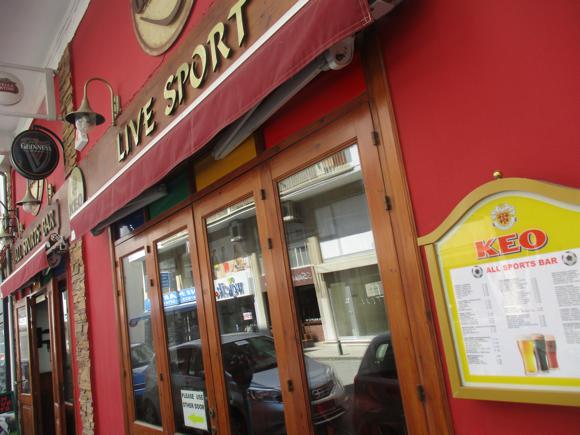
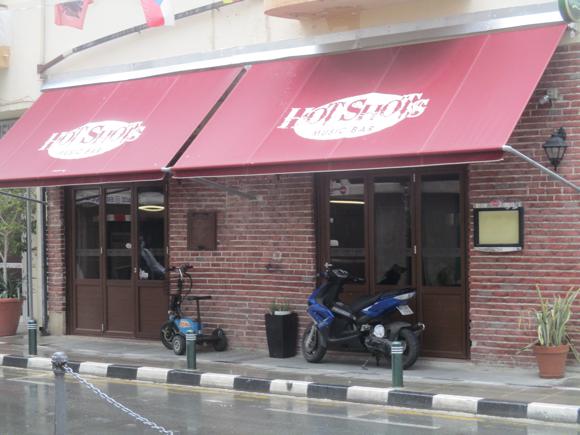
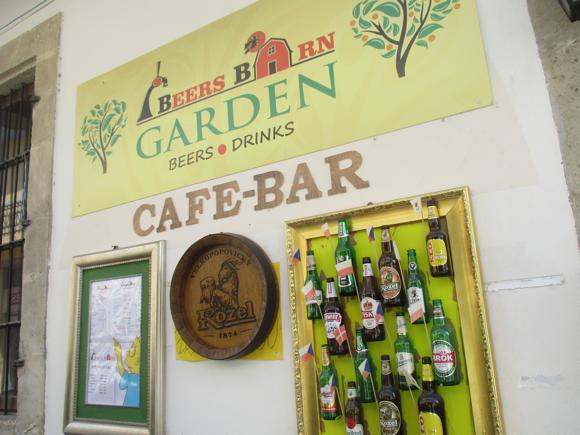
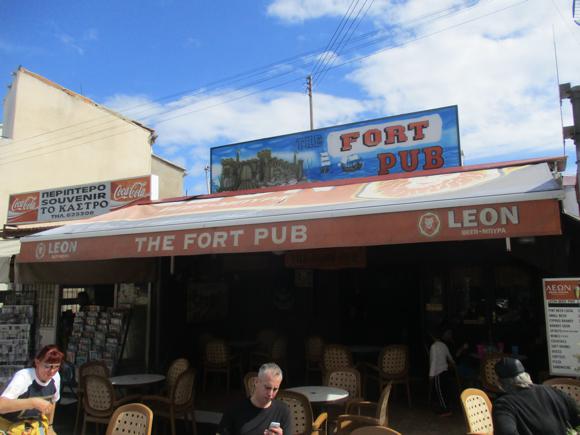
Between the two, set back on Evagora Pieridi, the All Sports Bar appeals to a slightly older clientele, again with football the focus.
Back on Kosma Lysioti, a little wander in from the beach brings you to the lively Hot Shots Music Bar, its cosy interior decked out in football scarves and shirts. Serious drinking and a damn fine time are had by all.
For something more chilled, the nearby Beers Barn Bar at Dimitriou 19 has a great range of drinks, plus pinball.
Finally, for a real dyed-in-the-wool expat hostelry, the Fort Pub has been sat behind the Medieval Fort on Piale Pasa for at least two generations, a reliable mainstay of Larnaca imbibery.
Where to stay
The best hotels for the stadiums and city centre
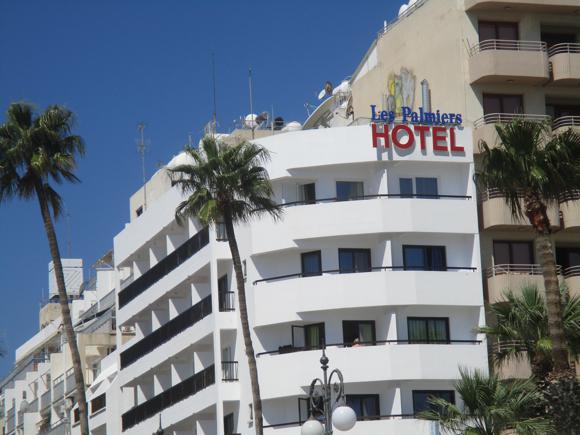
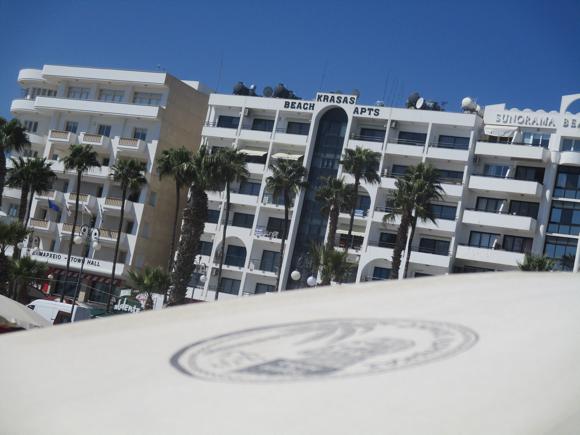
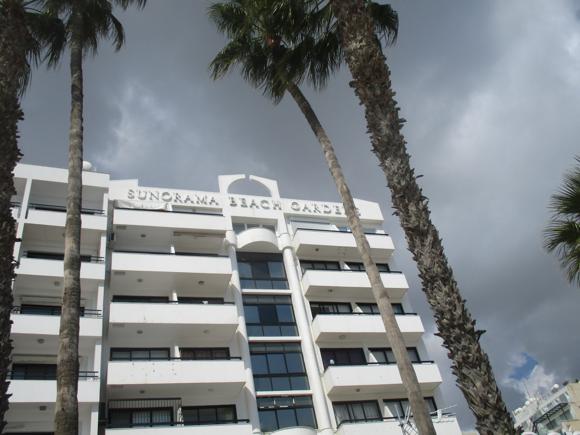
The Larnaca Tourist Board has a hotel database with weblinks.
There are no hotels near the AEK Arena – and you would be way out of town in any case.
Year-round resort hotels line the seafront. Les Palmiers Beach Hotel offers standard rooms, some with sea views, and attractive rates in winter.
Krasas Beach Apartments are a notch above, but you may not need a washing machine and kitchen. Sunorama Beach Garden 302 is in similar vein.
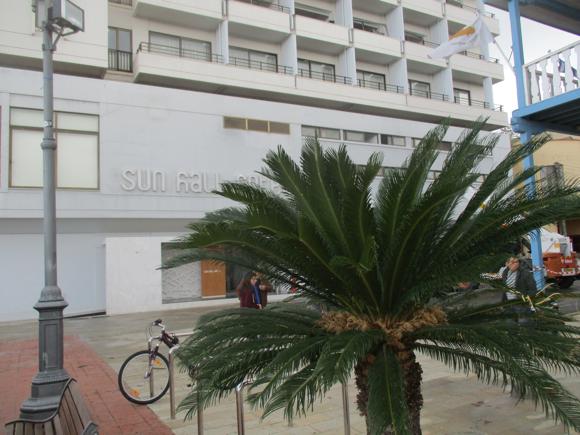
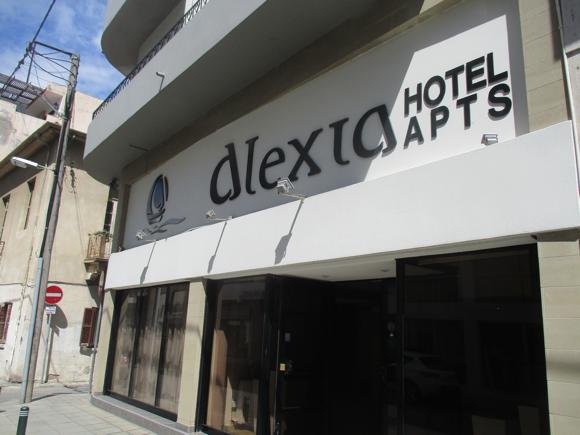
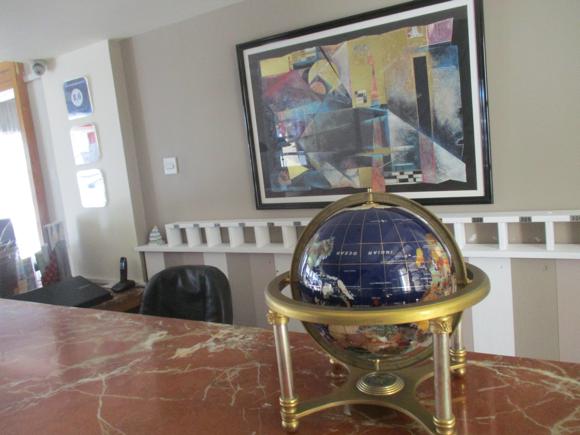
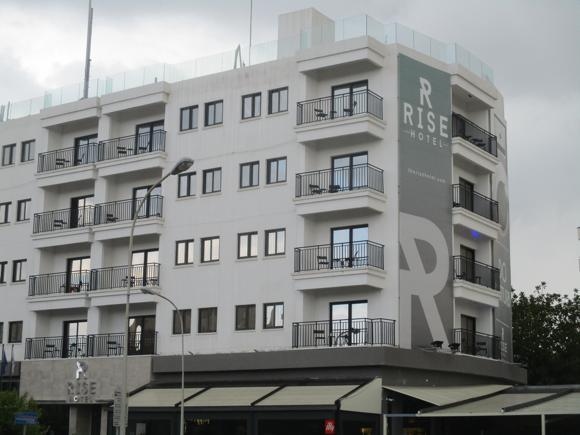
The Sun Hall Hotel gives that little bit extra, with a rooftop pool, gym, sauna and quality restaurant.
For those on a budget, the friendly, family-run Alexia Hotel Apartments are set a couple of streets back from the beach, close to the bar quarter and shopping district. It’s slightly more old-school but none the worse for it.
Away from the action but still walking distance to the beach, the Rise Hotel offers a contemporary boutique option, with a cocktail bar and 48 rooms and suites with flat-screen TVs.


